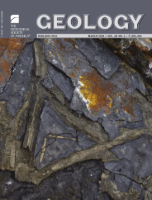
GEOLOGY
Scope & Guideline
Advancing Earth Sciences Through Innovative Research
Introduction
Aims and Scopes
- Tectonics and Structural Geology:
Research in this area explores the processes and mechanisms behind tectonic movements, faulting, and the structural evolution of Earth's crust, including studies of fault systems and their implications for seismic activity. - Sedimentology and Stratigraphy:
This scope includes investigations into sedimentary processes, depositional environments, and the stratigraphic record, aiming to understand past climates, sea-level changes, and sediment transport mechanisms. - Geochronology and Geochemistry:
The use of isotopic and elemental analysis to date geological events and understand the chemical evolution of the Earth is a key focus, enabling insights into the timing of tectonic, climatic, and biological changes. - Paleontology and Paleoecology:
Research in this area seeks to uncover the history of life on Earth through the study of fossils, their distributions, and the ecological dynamics that have influenced evolution over geological time. - Volcanology and Petrology:
This area covers the study of volcanic processes, magma generation, and the formation of igneous rocks, focusing on the physical and chemical processes that shape volcanic activity and crustal composition. - Environmental Geology and Geohazards:
Research addressing the interactions between geological processes and human activities, including assessments of geological hazards such as earthquakes, landslides, and volcanic eruptions, as well as the implications of climate change on geological processes.
Trending and Emerging
- Climate Change and Geological Responses:
Research examining the geological impacts of climate change, including sedimentation patterns, erosion rates, and the influence of changing climate on geological hazards, is gaining prominence as awareness of climate issues grows. - Geological Hazards and Risk Assessment:
An increased focus on understanding geological hazards, such as earthquakes and landslides, and their risks to human activities reflects a growing societal need for resilience and preparedness. - Geochemical Cycling and Biogeochemistry:
Emerging studies are increasingly looking at the interactions between biological processes and geological cycles, particularly in relation to carbon cycling and its implications for climate change. - Technological Advancements in Geological Research:
The integration of new technologies such as machine learning, remote sensing, and advanced geochronology techniques is becoming a significant trend, allowing for more detailed and comprehensive geological analysis. - Planetary Geology and Comparative Planetology:
Research exploring geological processes on other planetary bodies, particularly Mars and the Moon, is trending as interest in planetary exploration and understanding extraterrestrial geology increases.
Declining or Waning
- Traditional Mineralogy:
The focus on classical mineralogy studies, which primarily emphasized the identification and classification of minerals, appears to be waning, as the field shifts towards more applied geochemistry and mineral resources. - Static Geological Mapping:
Research centered on static geological maps and basic geological surveys is declining in favor of more dynamic studies that integrate geological mapping with modern techniques such as remote sensing and GIS. - Basic Rock Formation Studies:
There has been a noticeable decrease in publications focusing solely on the formation of specific rock types, as the journal increasingly prioritizes studies that link rock formation to broader geological processes and implications.
Similar Journals
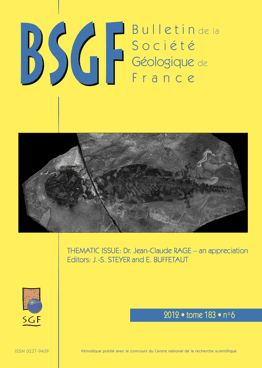
BSGF-Earth Sciences Bulletin
Connecting Researchers with Groundbreaking Earth InsightsWelcome to the BSGF-Earth Sciences Bulletin, a premier open-access journal published by EDP SCIENCES S A that has been illuminating the field of earth sciences since its inception. With an ISSN of 0037-9409 and an E-ISSN of 1777-5817, this journal has established itself as a vital platform for disseminating significant research findings and innovative studies in Earth and Planetary Sciences. Operating out of France, BSGF is recognized for its rigorous peer-review process and its commitment to accessibility, having transitioned to open access in 2018. This stature is reflected in its outstanding rankings, placing it in the Q1 quartile within both Earth and Planetary Sciences and Geology disciplines, and ranking #35/195 overall in the Scopus database. Researchers, professionals, and students alike will find the BSGF invaluable for its high-impact articles, which span a wide array of sub-disciplines, addressing both foundational concepts and contemporary challenges in earth sciences.

Russian Journal of Pacific Geology
Charting New Territories in Geological ResearchThe Russian Journal of Pacific Geology is a pivotal resource in the realm of Earth sciences, published by PLEIADES PUBLISHING INC. With an ISSN of 1819-7140 and an E-ISSN of 1819-7159, this journal has established itself as a significant publication for researchers, professionals, and students who explore the intricate geology of the Pacific region. Covering a wide array of topics including Geochemistry, Petrology, Geology, Geophysics, Oceanography, Paleontology, and Stratigraphy, the journal's relevance is underscored by its categorization within Q3 quartile rankings across multiple disciplines in the 2023 metrics. Operating from the United States, its influential publications span from 2007 to 2024, attracting a diverse audience dedicated to advancing the geological sciences. Although not an open access journal, it serves as a valuable repository of knowledge, presenting original research, reviews, and critical discussions that enhance scholarly discourse. The journal is recognized within the global scientific community, addressing significant geological challenges while fostering collaboration and innovation among scholars in the Earth and Planetary Sciences.
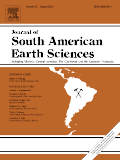
JOURNAL OF SOUTH AMERICAN EARTH SCIENCES
Pioneering Research in South American Earth SciencesJOURNAL OF SOUTH AMERICAN EARTH SCIENCES is a premier interdisciplinary journal dedicated to publishing high-quality research in the fields of Earth-Surface Processes, Geology, and Paleontology, making it an essential resource for scientists and researchers focused on South American geology and its diverse geological phenomena. Published by Pergamon-Elsevier Science Ltd in the United Kingdom, this journal has been instrumental in disseminating groundbreaking studies since 1988, showcasing contributions that push the boundaries of knowledge in Earth and Planetary Sciences. With an impressive Scopus ranking—positioning it in the 74th percentile for Paleontology and 71st for Geology—this journal not only reflects robust academic quality but also its commitment to addressing critical geological challenges in South America. Researchers will appreciate its objective of advancing understanding of geological processes while providing insights into past, present, and future Earth environments. Although available through traditional subscription models, the journal's vast repository of articles enriches the academic landscape, facilitating the sharing of vital research among professionals, students, and geological practitioners.
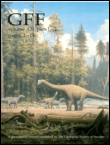
GFF
Advancing Earth Sciences Through Rigorous Research.GFF is a prestigious academic journal dedicated to advancing research in the fields of Geology and Paleontology. Published by Taylor & Francis Ltd in the United Kingdom, GFF serves as a vital platform for disseminating innovative findings and fostering discussions among researchers, professionals, and students alike. With a noteworthy impact factor reflecting its significance in the scientific community, GFF has achieved Q2 ranking in both Geology and Paleontology, underscoring its commitment to high-quality scholarship. The journal has been operational since 1872, accumulating a rich history of contributing to our understanding of earth sciences. It currently ranks #133 out of 321 in Earth and Planetary Sciences - Geology, and #50 out of 113 in Paleontology according to Scopus rankings. Although it does not offer an open access option, GFF remains accessible through various academic databases, ensuring that cutting-edge research reaches a wide audience. Its comprehensive scope aims to explore critical advancements in geological and paleontological sciences, making it an essential resource for those committed to exploring the intricacies of our planet’s past and present.

JOURNAL OF IBERIAN GEOLOGY
Unveiling the intricate layers of Iberian geological phenomena.JOURNAL OF IBERIAN GEOLOGY, published by Springer International Publishing AG, is a pivotal platform dedicated to advancing the field of geology and stratigraphy. With an ISSN of 1698-6180 and E-ISSN of 1886-7995, this journal has earned its reputation in the academic community, holding a commendable Q2 ranking in both Geology and Stratigraphy for 2023, reflecting its contributions to contemporary geological research. Spanning from 2007 to 2024, it provides a comprehensive forum for scholars and practitioners from around the globe to disseminate their findings pertaining to the Iberian Peninsula, enhancing the understanding of regional geological phenomena. The journal has carved out a significant niche within the Earth and Planetary Sciences, ranking #137 out of 321 in Geology and #24 out of 55 in Stratigraphy, indicating its wide-reaching impact and scholarly engagement. The Journal of Iberian Geology serves as an indispensable resource for those interested in the complexities of geological structures, stratigraphic sequences, and the broader implications of geological research, making it a vital reference for researchers, professionals, and students alike.
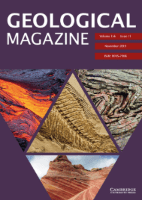
GEOLOGICAL MAGAZINE
A Legacy of Excellence in Geological ScholarshipGEOLOGICAL MAGAZINE, published by Cambridge University Press, is a premier journal in the field of geology, renowned for its rich legacy since 1864 and ongoing contributions to Earth and Planetary Sciences. With an impressive Q1 ranking in Geology and a Scopus rank of #70 out of 321 journals, it holds a significant position within the academic community, appealing to researchers, professionals, and students alike. The journal covers a wide array of topics, ensuring a comprehensive platform for the dissemination of cutting-edge geological research. Although it does not offer open access, it remains a vital resource for those seeking to stay abreast of advancements in the field. With an enduring commitment to quality, GEOLOGICAL MAGAZINE stands as an essential outlet for scholarly communication and serves as a catalyst for academic discourse within the geological sciences.
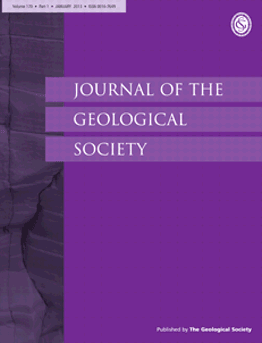
JOURNAL OF THE GEOLOGICAL SOCIETY
Elevating Earth Sciences Through Peer-Reviewed ExcellenceJOURNAL OF THE GEOLOGICAL SOCIETY, published by GEOLOGICAL SOC PUBL HOUSE, is a premier academic journal dedicated to advancing the field of geology. With a rich history dating back to 1845 and continuously published until 2024, this journal caters to a diverse audience of researchers, professionals, and students involved in earth sciences. The journal is recognized for its high impact factor, situating it in the top Q1 category in the field of geology, as indicated by its impressive Scopus rank of #49 out of 321, positioning it at the 84th percentile in Earth and Planetary Sciences. This esteemed scholarly platform promotes rigorous peer-reviewed research, ensuring that novel findings contribute to the global geological discourse. Although it operates under a subscription model, the journal's archive offers valuable insights for anyone pursuing excellence in geological research. The JOURNAL OF THE GEOLOGICAL SOCIETY stands as a vital resource for disseminating scientific knowledge and fostering educational growth within the field.

INTERNATIONAL JOURNAL OF EARTH SCIENCES
Transforming Understanding of Geological ProcessesINTERNATIONAL JOURNAL OF EARTH SCIENCES, published by Springer, is a leading journal in the field of Earth and Planetary Sciences, distinguished by its Q1 quartile ranking in the 2023 category of Earth and Planetary Sciences (miscellaneous). With an ISSN of 1437-3254 and an E-ISSN of 1437-3262, this journal has been a pivotal platform for researchers, academics, and practitioners since its inception in 1996. The journal's focus encompasses a broad range of topics within Earth sciences, making it a vital resource for contributions that enhance our understanding of geological processes, climate change, and planetary dynamics. The impact factor reflects its high standards and the significance of the research it publishes, ranking it in the 74th percentile among its peers as per Scopus. Furthermore, the journal offers Open Access options, facilitating the global dissemination of groundbreaking research. The editorial team is committed to advancing knowledge in Earth sciences, serving as an essential reference for students and professionals looking to engage deeply with this dynamic field.

Turkiye Jeoloji Bulteni-Geological Bulletin of Turkey
Advancing geological research for a sustainable future.Turkiye Jeoloji Bulteni-Geological Bulletin of Turkey (ISSN: 1016-9164) is a prominent scholarly journal published by the TMMOB JEOLOJI MUHENDISLERI ODASI in Türkiye, dedicated to advancing the field of geology through high-quality research and dissemination of significant scientific findings. With an emphasis on geological studies pertinent to the region and its global implications, the journal serves as a crucial platform for researchers, professionals, and students aiming to share and explore innovative theories, methodologies, and case studies. Although the journal operates under a traditional access model, its rich content provides valuable insights into varied topics including but not limited to mineralogy, geophysics, petrology, and environmental geology. Furthermore, the journal's commitment to exhibiting originality and relevance ensures its vital role in shaping geological research, fostering collaboration among academics and practitioners alike.

Swiss Journal of Geosciences
Unlocking the Secrets of Our Planet, One Article at a TimeSwiss Journal of Geosciences is a prestigious academic journal dedicated to advancing the field of geosciences, published by SPRINGER INTERNATIONAL PUBLISHING AG. Since its inception in 2007, the journal has established itself as a leading platform for disseminating high-quality research findings in various domains related to Earth and planetary sciences, achieving a notable Q1 ranking in Geology as of 2023. With a solid reputation reflected in its Scopus ranking of Rank #72/321, the journal stands in the 77th percentile within its category. Based in Switzerland, the Swiss Journal of Geosciences embraces an open access model, making it easier for researchers, professionals, and students worldwide to access vital geological research without barriers. The journal’s objectives include promoting interdisciplinary research and fostering insights that address both fundamental and applied geoscientific problems, ensuring it remains a crucial resource for those seeking to understand our planet’s dynamics. Engage with pioneering research and contribute to the vibrant community of geoscientists by exploring the impactful articles published within its pages.